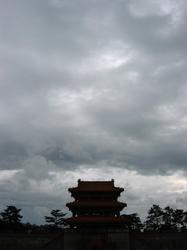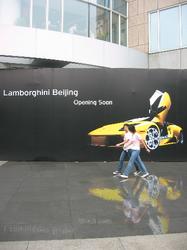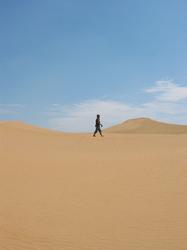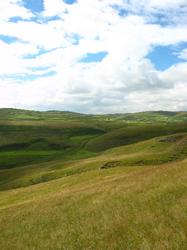Shenyang: The truth flows with the wine
The story the government didn’t want to be told
 SHENYANG, Liaoning — I expected Mr. Shi to be waiting for me at the train station with a cold beer in one hand and an itinerary in the other. In the weeks leading up to my departure from Shanghai, and during my first month of traveling, he had been by far the most attentive and persistent of my contacts along the route.
SHENYANG, Liaoning — I expected Mr. Shi to be waiting for me at the train station with a cold beer in one hand and an itinerary in the other. In the weeks leading up to my departure from Shanghai, and during my first month of traveling, he had been by far the most attentive and persistent of my contacts along the route.
He sent long emails and presented a detailed plan of attack for visiting the dozens of attractions Shenyang had to offer (even though every Chinese person I questioned leading up to my arrival in Shenyang had trouble naming one thing worth seeing in the city). He called me weekly, sometimes more often than that, his deep voice checking up on my current whereabouts and my estimated date of arrival in Shenyang. He wanted to make sure he was at the train station to greet me.
In Beijing, I finally had an answer for Mr. Shi. I would arrive on Saturday — at 2 a.m. I felt bad, but there were no other options.
“Mr. Shi,” I said to him over the phone, “we would be happy to get a hotel room that night. You could just meet us in the morning.”
“Nonsense,” his voice boomed back at me. “Saturday morning is still Friday night to us. It’s time to play. We will drink beer while we wait for you. It will be a party.”
There are stereotypes about dong bei ren, people from northeastern China: They are a hard-drinking lot — chuggers of both beer and bai jiu — and they are so amazingly gracious it makes you feel guilty. I can confirm both of these stereotypes to be accurate.
09.24.2004, 1:45 PM · Liaoning, Stories, The Trip · Comments (20)
Beijing: I hear it’s a nice place
 BEIJING — I’m not going to write much about Beijing. Because, frankly, I didn’t do much in Beijing. I treated my six days in China’s capital as a vacation from traveling through China. And, the mere fact that I could do a thing like that — the concept initially sounds rather absurd — should tell you that Beijing bears little resemblance to the rest of the country that it governs. It is a foreign city to almost anyone, Chinese or non-Chinese, who visits it. And, as China remodels — no, revamps — its centerpiece city in preparation for the 2008 Olympics, Beijing may soon feel foreign to Beijingers themselves, if that hasn’t happened already.
BEIJING — I’m not going to write much about Beijing. Because, frankly, I didn’t do much in Beijing. I treated my six days in China’s capital as a vacation from traveling through China. And, the mere fact that I could do a thing like that — the concept initially sounds rather absurd — should tell you that Beijing bears little resemblance to the rest of the country that it governs. It is a foreign city to almost anyone, Chinese or non-Chinese, who visits it. And, as China remodels — no, revamps — its centerpiece city in preparation for the 2008 Olympics, Beijing may soon feel foreign to Beijingers themselves, if that hasn’t happened already.
So yes, I walked the Great Wall, and it was indeed “great.” I entered the Forbidden City, and it was crowded. I wandered some traditional hutong neighborhoods, and they were still standing. According to a recent report, Beijing was home to more than 7,000 hutongs in 1949. In the late 1980s, only 3,900 remained. Recently, with the radical pre-Olympic restructuring, they have been disappearing at an alarming rate — more than 600 a year. Soon Beijing may be the Great Wall and the Forbidden City … and a modernish city that no one recognizes.
But a modernish city isn’t a bad place to escape for a while when you’ve been traveling through a third-worldish country. And I made the most of it, eating non-Chinese food whenever possible. It’s strange that the foods that would upset my stomach in America — actually, foods that I would never touch in America, like McDonald’s, KFC, Pizza Hut, and their ilk — are the ones I have relied upon to settle my often unstable insides during this trip.
09.15.2004, 4:51 PM · Beijing, The Trip · Comments (2)
Beds, bathhouses and the Gobi Desert
 BAOTOU, Inner Mongolia — My former student Diamond is particularly pleasant. She has a round face, a big smile and eyes that twinkle as though she is always thinking of something very amusing. She is one of the sweetest people I know.
BAOTOU, Inner Mongolia — My former student Diamond is particularly pleasant. She has a round face, a big smile and eyes that twinkle as though she is always thinking of something very amusing. She is one of the sweetest people I know.
When I sent Diamond a text message reminding her that I would not be arriving at her Baotou home alone, she immediately replied with this: “Excuse me Dan could you please tell me the sex of your traveling companion?”
I told her it was Johnson. Diamond, aka Chen Wen Yi, remembered him from my class and said she was excited to see him again. And I thought everything was fine. I didn’t realize this revelation sent Diamond into a tizzy.
You see, Diamond, 20, and her mother share a small two-bedroom flat. In fact, Diamond warned me via text message that her place was a “slum. :)” (she ends all of her messages with a smiley face). But that wasn’t the problem. The problem was that Johnson was a man.
Diamond could sleep on her bed. Her mom could sleep on the couch in the living room — she often does this anyway. But that only left one double bed. And somewhere in her schooling, Diamond read a report that said a foreign man would never share a bed with another man — and if he did, he was surely a homosexual.
Diamond, evidently, did not want to turn her English teacher into a homosexual.
“So I dare not ask you to do this,” she explained later.
09.07.2004, 3:46 PM · Inner Mongolia, The Trip · Comments (14)
Inner Mongolia: Finding God in the grasslands
 ER YANG BO VILLAGE, Inner Mongolia — I spent a good chunk of a week in Inner Mongolia — and I met not one person of Mongolian descent. I did meet three Roman Catholics, however. And thus, after one month on the road in this officially atheist country, my curiously lengthy list of religious run-ins grew a little bit longer.
ER YANG BO VILLAGE, Inner Mongolia — I spent a good chunk of a week in Inner Mongolia — and I met not one person of Mongolian descent. I did meet three Roman Catholics, however. And thus, after one month on the road in this officially atheist country, my curiously lengthy list of religious run-ins grew a little bit longer.
This was in Er Yang Bo — population less than 100 — an increasingly touristed farming village in the central part of Inner Mongolia, the autonomous (in name only) region that covers a long swath of land in northern China, stretching from the northwest to the northeast and bordering eight other provinces or autonomous regions, Mongolia and Russia.
More than 85 percent of Inner Mongolia’s population is Han Chinese, and tourists who visit the region in search of Mongolians or signs of a traditional Mongolian way of life often leave disappointed. But, while post-1949 Inner Mongolia may be somewhat culturally barren, its rolling and wide-open landscape is beautiful — a wonderful place to get lost for a while and escape a sultry Chinese summer.
09.02.2004, 10:45 PM · Inner Mongolia, The Trip · Comments (5)
